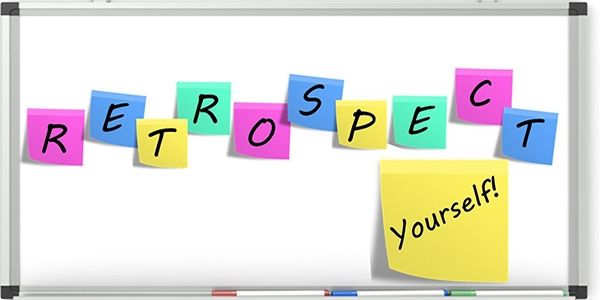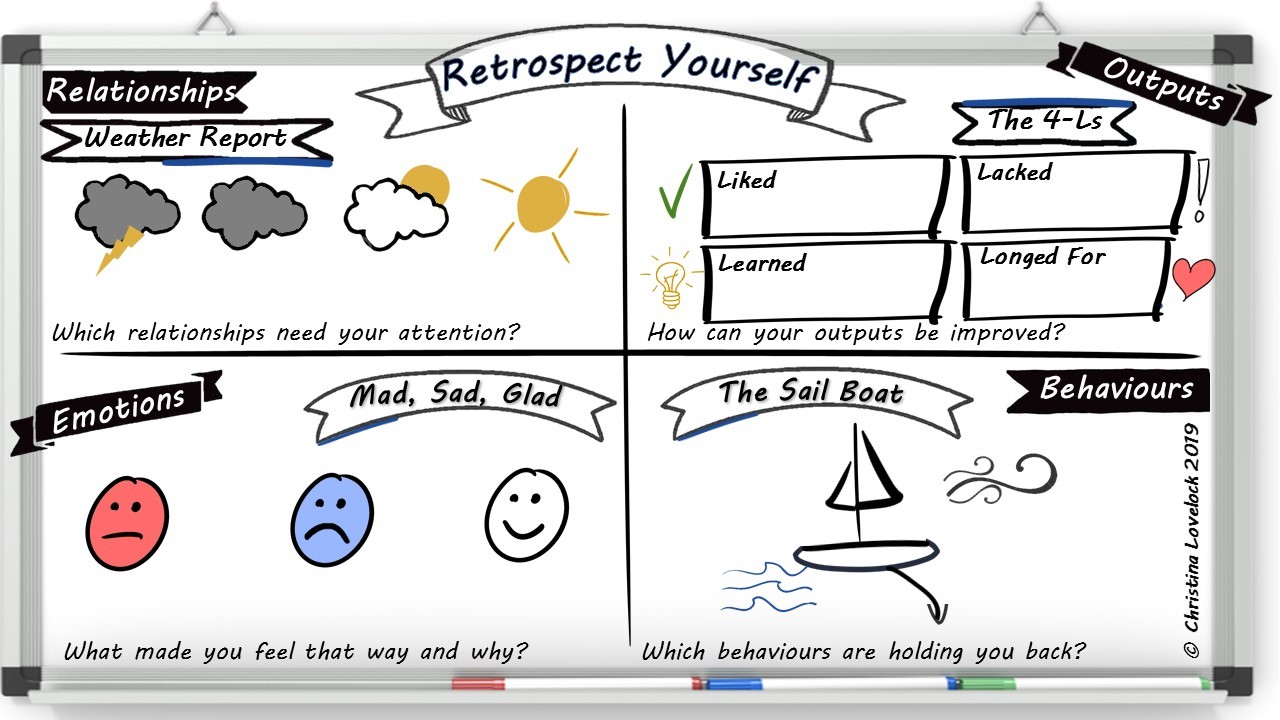
Retrospect Yourself!
‘At regular intervals, do you reflect on how to become more effective, then tune and adjust your behaviour accordingly?’
It easy to suggest process improvements, and changes that other people need to make to enable a team to be more effective. It is much harder to really reflect on ourselves and our contribution, and consider how that can be improved.
We need to be mindful of four areas which are key to personal effectiveness: relationships, emotions, behaviours and outputs. There are a variety of retrospective techniques which are useful to explore these areas.

Relationships: The Weather Report
Which relationships could be better? The way we view the ‘work’ part of being at work is usually driven by the quality of our interactions and relationships. Getting better at your ‘work’ means investing in and improving your relationships.
SUNNY: What do you need to do to maintain and enhance your best relationships? It is easy to neglect people who we know we work well with. We need to remember to make time to meet with close colleagues for a coffee, to catch up and exchange ideas. This can provide a much needed energy boost. How can you show your appreciation or acknowledge the value of the relationship? What opportunities are there for you to work closely together or support each other?
PARTIAL SUN: Which relationships are emerging? Who would you like to know better? Who have you had a better relationship with in the past? How can you invest in that relationship again?
GREY CLOUD: Who do you ‘co-exist’ with? Is there someone whose name is really all you know about them? Can you make a new team member feel welcome? Can you reach out to someone who often works alone?
STORMY: Which relationships contain conflict? Who do you avoid? Whose emails make your heart sink? Finding a way to build these relationships may have the most drastic impact on your working life, but are likely to need the most courage and commitment to address.
Outputs: The 4-Ls
How can your outputs be improved?
LIKED: What did you enjoy doing and why? how can you do more of that in future? When did you feel pride in your work? Do you know what your strengths are? Where do you get the opportunity to use them?
LACKED: What information did you need to access that you couldn’t find? Whose time and input did you need that you couldn’t get? What resources would have been useful? What seemed particularly difficult to accomplish and why? What skills do you need to develop?
LEARNED: What did you learn about yourself, your organisation and your stakeholders? What new skills or techniques have you learned? How will you store, share or re-use knowledge you gained?
LONGED FOR: Which techniques would you really like to try? What ideas do you want to put into practice? What skills do you particularly want to develop? Who would you like to work with? What opportunities do you want explore?
Emotions: Mad, Sad, Glad
What made you feel that way an why?
MAD: What feelings of anger and resentment are you harbouring? What mistakes did you make that made you mad with yourself? How is anger impacting your effectiveness? Was the anger justified?
SAD: What opportunities were missed? Did anything make you feel disappointed? Do you have feeling of loss associated with something ending or someone leaving?
GLAD: What brought you feelings of enjoyment, happiness and pride? Who do you feel grateful towards? How did you celebrate milestones and achievements?
Behaviours: The Sail Boat
Do you like how you behave at work? How do your behaviours impact your relationships and effectiveness? Are you avoiding common bad behaviours?
ANCHORS: Which behaviours are holding you back and dragging you down? They keep you in a fixed mindset, damage relationships, make you fearful of change and prevent you from learning.
WIND: What puts wind in your sails? What do people compliment you on? What behaviours do you display when you are ‘having a good day’? How do you keep going even when it feels difficult?
Conclusion
The purpose of this retrospective is to become more self-aware, to learn and to facilitate personal improvement, NOT to create a list of reasons to be hard on ourselves. To paraphrase the Prime Directive for retrospectives, by Norm Kerth:
“Regardless of what I discover, I understand and truly believe that I did the best job I could, given what I knew at the time, my skills and abilities, the resources available, and the situation at hand.”
We must practise self-reflection with self-compassion.